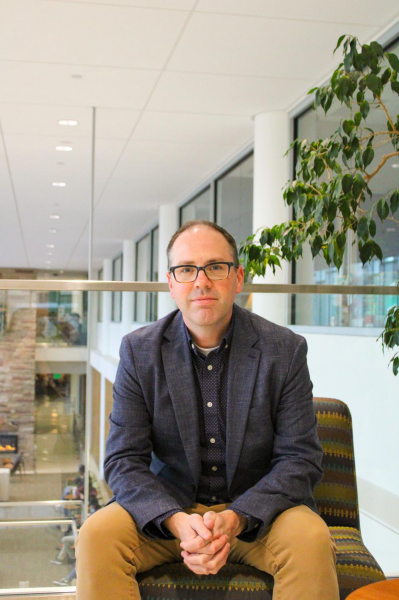Associate Professor
About
Find Me On:
linkedinRole
FacultyPosition
- Associate Professor
- Director, Queer Memory Project of Northern Colorado
- Director, Humanities Baseline
- WICHE Leadership Fellow, Joe Blake Center for the Engaged Humanities
Concentration
- Rhetoric
- LGBT Studies
- Queer Theory
- Public Memory
- Visual Communication
- Monuments
- Criticism
Department
- Communication Studies
Education
- Ph.D., University of Pittsburgh
Curriculum Vitae:
Biography
DR. THOMAS R. DUNN is an Associate Professor of Communication Studies, an administrator in the Joe Blake Center for the Engaged Humanities, and a fellow in the WICHE Academy for Leaders in the Humanities, a program supported by the Andrew W. Mellon Foundation. Previously, Dr. Dunn held the titles of Monfort Professor (2020-2023) and Presidential Leadership Fellow (2023-2024) at Colorado State University. He remains the founding director of the Queer Memory Project of Northern Colorado (http://www.qmpnoco.org), an educational and community-based project to preserve and share the LGBTQ+ past of Northern Colorado. Dr. Dunn joined the faculty at Colorado State in the Fall of 2012 where he teaches classes in rhetorical studies, including undergraduate classes in the History and Theory of Rhetoric, Rhetorical Criticism, the Rhetoric in Social Movements, and Communicating the Queer Past. He also teaches graduate classes in the History of Rhetorical Theory, Rhetorical Criticism, and Queer Rhetorics. Dunn is also a highly-sought adviser and mentor of graduate students and new teachers in higher education. Dr. Dunn earned both his Doctorate in Communication and a Certificate in the Study of Women, Gender, and Sexuality at the University of Pittsburgh ('11).
Dr. Dunn's primary research agenda investigates the intersection of LGBT/queer culture, politics, and rhetoric with a focus on public memory and visual and material rhetorics. His 2016 book Queerly Remembered: Rhetorics for the Representing the GLBTQ Past explores how LGBTQ people use public tellings of their shared pasts to create political, social, and cultural change in the present. Dr. Dunn is also the author of the upcoming book The Pink Scar: How Nazi Persecution Shaped the Struggle for LGBTQ+ Rights at Penn State University Press (expected October 2025). His writing appears in venues like the Quarterly Journal of Speech, Rhetoric Society Quarterly, Communication & Critical/Cultural Studies, Rhetoric & Public Affairs, the Western Journal of Communication, and the Southern Communication Journal, as well as the Denver Post. Dr. Dunn is also the winner of several awards, including the 2011 National Communication Association's Stephen E. Lucas Debut Publication Award, the 2012 Gerald R. Miller Outstanding Doctoral Dissertation Award, the 2014-2015 Excellence in Teaching Award from CSU's College of Liberal Arts, the 2017 New Investigator Award from the Critical/Cultural Studies Division of NCA, and the 2018 Book of the Year Award from the GLBTQ Communication Studies Division of NCA.
Publications
Books:
- The Pink Scar: How Nazi Persecution Shaped the Struggle for LGBTQ+ Rights (Penn State University Press, expected October 2025).
- Queerly Remembered: Rhetorics for Representing the GLBTQ Past (University of South Carolina Press, September 2016).
Select Articles:
- "Grinding against Genocide: Rhetorics of Shame, Sex, and Memory at the Memorial to the Murdered Jews of Europe." RSQ: Rhetoric Society Quarterly (Aug. 2019): 365-386, https://doi.org/10.1080/02773945.2019.1645347.
- “Whence the Lesbian in Queer Monumentality? Intersections of Gender and Sexuality in Public Memory.” Southern Communication Journal, special issue on Gender and Public Memory 82, no. 4 (2017): 203-215, doi: 10.1080/1041794X.2017.1332090.
- “Playing Neoliberal Politics: Post-Racial and Post-Racist Strategies in ‘Same Love.’” Communication and Critical/Cultural Studies (2016), doi:10.1080/14791420.2016.1149201.
- “(Queer) Family Time: Brothers & Sisters and Managing Temporal Anxieties.” Western Journal of Communication 79, no. 2 (2015): 133-150, doi: 10.1080/10570314.2014.943420. *Winner of 2016 B. Aubrey Fisher Outstanding Journal Article Award
- “The Quare in the Square: Memories, Queer Sensibilities, and Oscar Wilde.” Quarterly Journal of Speech 100, no. 2 (2014): 213-240, doi: 10.1080/00335630.2014.959987.
- “The Tale of Two Oaths: Inaugural Oaths, Technical Memories, and Presidential Investiture.” South Communication Journal 79, no. 5 (2014): 427-447, doi: 10.1080/1041794X.2014.933869.
- “Remembering ‘A Great Fag’: Visualizing Public Memory and the Construction of Queer Space.” Quarterly Journal of Speech 97, no. 4 (2011): 435-60, 10.1080/00335630.2011.585168.
- “Remembering Matthew Shepard: Violence, Identity, and Queer Counterpublic Memories.” Rhetoric & Public Affairs 13, no. 4 (2010): 611-52, 10.1353/rap.2010.0212. *Winner of the 2011 Stephen E. Lucas Debut Publication Award
Courses
-
SPCM 201: History and Theory of Rhetoric (previously Rhetoric & Western Thought)
An introduction to the foundational theories and principles of one of the central areas of the Communication discipline – the study of rhetoric…The organization of this course highlights prominent ways of viewing rhetoric in three different eras across the globe – the ancient period, the period between the Roman Republic and the early modern era, and the late modern and postmodern period. We will investigate each of these periods, not as isolated moments, but as highly intertwined events in the history of global thought.
-
SPCM 612: Rhetorical Criticism
A graduate-level introduction to rhetorical criticism, the art of evaluating rhetorical artifacts in pursuit of public knowledge. In addition to covering the history of rhetorical criticism’s development, this class aims to prepare graduate students to be scholarly writers in the humanities. As such, we will pay particular attention to the role of the critic, the audience, the artifact, and the various methods for doing rhetorical criticism, as well as two different publication processes (academic publication and public scholarship).
-
SPCM 792A: Queer Rhetoric(s): Theory, Criticism, and Production
An examination of foundational and contemporary theories, artifacts, and worldmaking-acts that help constitute queer life and politics, with an emphasis on communication and rhetoric.
